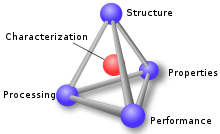Материал пĕлĕвĕ
Материалсен пĕлĕвĕ, йăмлăхсен пĕлĕвĕ — хытă е шĕвек тăрăмри материалсен енĕсем (пахалăхĕсем, палăрăмĕсем) тата вĕсем улшăнни тĕрлĕрен факторсенчен еплерех килнине тишкерекен дисциплинăсем хушшинчи ăслав.

Вуламалли
тӳрлет- Ashby, Michael; Hugh Shercliff; David Cebon (2007). Materials: engineering, science, processing and design (1st ed.). Butterworth-Heinemann. ISBN 978-0-7506-8391-3.
- Askeland, Donald R.; Pradeep P. Phulé (2005). The Science & Engineering of Materials (5th ed.). Thomson-Engineering. ISBN 978-0-534-55396-8.
- Callister, Jr., William D. (2000). Materials Science and Engineering – An Introduction (5th ed.). John Wiley and Sons. ISBN 978-0-471-32013-5.
- Eberhart, Mark (2003). Why Things Break: Understanding the World by the Way It Comes Apart. Harmony. ISBN 978-1-4000-4760-4.
- Gaskell, David R. (1995). Introduction to the Thermodynamics of Materials (4th ed.). Taylor and Francis Publishing. ISBN 978-1-56032-992-3.
- González-Viñas, W. & Mancini, H.L. (2004). An Introduction to Materials Science. Princeton University Press. ISBN 978-0-691-07097-1.
- Gordon, James Edward (1984). The New Science of Strong Materials or Why You Don't Fall Through the Floor (eissue ed.). Princeton University Press. ISBN 978-0-691-02380-9.
- Mathews, F.L. & Rawlings, R.D. (1999). Composite Materials: Engineering and Science. Boca Raton: CRC Press. ISBN 978-0-8493-0621-1.
- Lewis, P.R.; Reynolds, K. & Gagg, C. (2003). Forensic Materials Engineering: Case Studies. Boca Raton: CRC Press.
- Wachtman, John B. (1996). Mechanical Properties of Ceramics. New York: Wiley-Interscience, John Wiley & Son's. ISBN 978-0-471-13316-2.
- Walker, P., ed. (1993). Chambers Dictionary of Materials Science and Technology. Chambers Publishing. ISBN 978-0-550-13249-9.